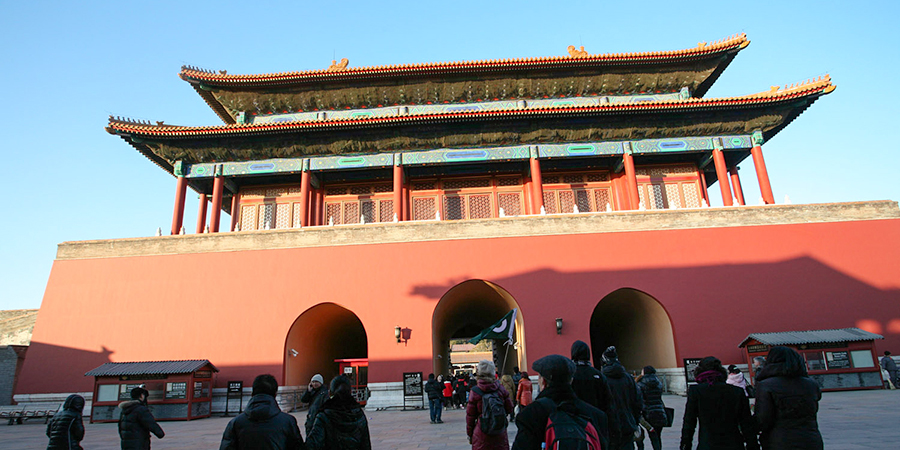West Prosperity Gate (Xihuamen)
What does West Prosperity Gate (Xihuamen) Look like?
There are 3 openings for people to pass through. Above, the gate tower is 5-room wide and 3-room deep, which was used for the installation of cotton and ingot armor used for the army parade. There were Mongolia, Chinese and Manchu three types of characters on “Xihuamen” plaque at the beginning. Then it was reduced to Manchu and Chinese. After 1911, only Chinese characters remained on it.
 |
Location not in the Middle of the West Wall, but South
The whole Forbidden City is built symmetrically. According to this rule, the West Prosperity Gate should be in the middle of the west wall, just like the south and north gates are in the middle of the south and north walls. But this is not the fact. The Xihuamen is actually south to the middle point of the west wall, closer to south gate than the north gate. This has something to do with the functional division of the Forbidden City. The Forbidden City is divided into two parts: the outer court for political activities and the inner court for living. The Hall of Martial Valor (Wuyingdian), Gate of Supreme Harmony (Taihedian) and the Hall of Mandarin (Wenhuadian) form the west-east axis of the outer court and Xihuamen and Donghuamen are at the two ends of the axis. Such a layout not only makes it convenient for officials to enter and leave the outer court, but also can reduce the interference to the inner court.
Uprising of Tianlijiao
By the time of reign of emperor Jiaqing (1796 - 1820), a number of secret rebelling organizations had formed in many places. Tianlijiao was one of the most influential at that time.
Lin Qing and his companions decided to overthrow the Qing dynasty. On September 15 of 1813, he sent a team of 200 men to sneak into Beijing City, intending to assassinate emperor Jiaqing. Benefiting from the cooperation of the eunuch in the Forbidden City, a part of them chose to attack from East Prosperity Gate, but eventually failed because of the early exposure of weapons. Another group entered from West Prosperity Gate, and they were not found until they rushed all the way into the square of Qianqingmen. Although Tianlijiao’s invasion of the Forbidden City failed, it was enough to strike terror into the hearts of the Qing rulers. Emperor Jiaqing also issued a “Zui Ji Zhao” decree to repent his mistakes.
Empress Dowager Cixi and Emperor Guangxu Fled from Xihuamen
In the twenty-sixth year of the reign of emperor Guangxu in 1900, Cixi wanted to use the boxer rebellion to wipe out the foreigners' prestige and remove the obstacles to the abolition of the emperor Guangxu. Unexpectedly, this drew eight allied forces into Beijing, whom the Qing army could not resist. So in a hurry, Cixi took emperor Guangxu and escaped from the Forbidden City to save their life. It was via Xihuamen that they left in panic. After, Cixi had to pay a huge sum of money to return to the Forbidden City.